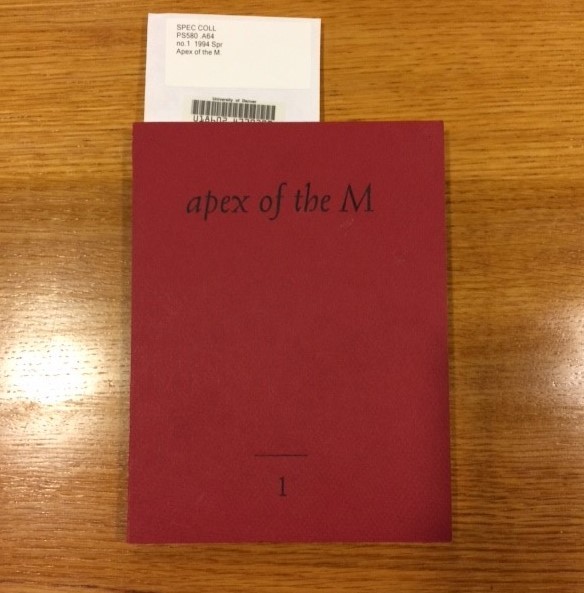The Spirit is the Conscious Ear: 'apex of the M'

The University of Denver (DU) Libraries recently acquired The Little Magazine in America Collection from Granary Books. It so happens that I’m a librarian at DU, and I’m a poet. As you might imagine, the prospect of spending time with this collection is thrilling. Over the next few months, I’ll explore the importance of The Little Magazine in America Collection in regard to the history of small press publications in the United States, and I’ll call attention to connections that branch from poets whose work appears in the collection, poets whose work has informed mine.
Full disclosure: I’m going at all this in no grand order, following threads when and where they present themselves. Now that that’s out of the way, I want to talk about apex of the M, published in Buffalo, New York, from 1994–1997, edited by Lew Daly, Alan Gilbert, Kristin Prevallet, and Pam Rehm; contributing editors included Susan Howe, David Levi Strauss, John Taggart, Keith Waldrop, and Rosmarie Waldrop. In The Little Magazine Collection at DU are issues 1 and 2 of apex of the M, published in Spring and Fall 1994.
In 1994’s midterm election, on the heels of a document called “Contract with America,” the Republican Party gained control of both the House and Senate for the first time in forty years. Written by Newt Gingrich and Dick Armey, and based partly on Ronald Reagan’s 1985 State of the Union address, “Contract with America” is, at best, sinister word salad.
In issue 2 of apex of the M, the editors offer “The Contextual Imperative,” which includes this prescient passage:
[…] we feel that in the present poetical and political climate a merely avant-garde ideology of the politics of poetry no longer suffices when, for instance, Reagan’s, Bush’s, and Quayle’s extemporaneous public comments are themselves a kind of Language poetry: any language that creates or reflects the kinds of diversions and sedations required for the triumph of capital is, finally, a language of denial.[1]
 When one pairs the passage above with the passage at left (from issue 1’s “State of the Art” editorial)[2], it becomes apparent that apex of the M has no truck with a language of denial, a language of presumption, a language of complacency.
When one pairs the passage above with the passage at left (from issue 1’s “State of the Art” editorial)[2], it becomes apparent that apex of the M has no truck with a language of denial, a language of presumption, a language of complacency.
There’s a great Peter O’Leary essay that addresses apex of the M’s “State of the Art,” as well as the poetry of Joseph Donahue and Rehm (both of whom saw their poems published in apex of the M). In “Apocalypticism: A Way Forward for Poetry,” O’Leary writes:
[…] the editors of apex of the M … opened their inaugural issue with an editorial predicting the academic institutionalization of both traditional workshop poetry and Language poetry. This was not such a stretch, even at the time; but these were the only experimental or avant-garde writers making such a critique, and it earned them great scorn in some quarters. My suspicion is that they wrote the editorial in response to their growing disenchantment with so-called radical poetry, which wasn’t remotely radical — at least not in the Christian apocalyptic sense that was then attracting their attention.[3]
O’Leary notes that the editorial was intended not only as a provocation, but also an indictment of secular models for contemporary writing. Along the same lines, toward the close of “The Contextual Imperative,” is a dictum I want framed: “Poetry must grind at inequity, incessantly.”[4]
And then there’s the inclusion of Rehm’s poems, “The Humiliation of the Valley” and “The Concept of Dread” in issue 2. These poems would go on to appear in Gone to Earth, published in 2001 by Flood Editions. There’s a point early in “The Concept of Dread” in which Rehm, with her Conscious Ear, clearly renders the disparity and despair that hard assets provoke:
Dearly beyond
We are scattered here today
amongst commodities
This town isn’t big enough
for trust[5]
I’ll not continue to explicate; Rehm’s poems, gems the likes of which poetry rarely receives, speak for themselves and have done so for nearly thirty years. For more, see Rehm’s writing on John Taggart in a 2014 piece here on Jacket2, a 2015 interview in Colorado Review, and a PDF of Pollux, a 1992 Leave Press chapbook. Finally, I’d encourage you to pay time, mind, and heart to Rehm’s full-length collections: The Garment in Which No One Had Slept (Burning Deck, 1993), To Give It Up (Sun and Moon Press, 1995), Gone to Earth (Flood Editions, 2001), Small Works (Flood Editions, 2005), The Larger Nature (Flood Editions, 2011), and Time Will Show (Shearsman Books, 2018).
1. Lew Daly et al., “The Contextual Imperative,” apex of the M, no. 2 (Fall 1994): 5.
2. “State of the Art,” apex of the M, no. 1 (Spring 1994): 1–7.
3. Peter O’Leary, “Apocalypticism: A Way Forward for Poetry,” Chicago Review 55, no. 3–4 (2010): 84.
5. Pam Rehm, “The Concept of Dread,” apex of the M, no. 2 (Fall 1994): 39-44.
The Little Magazine in America Collection at University of Denver Libraries